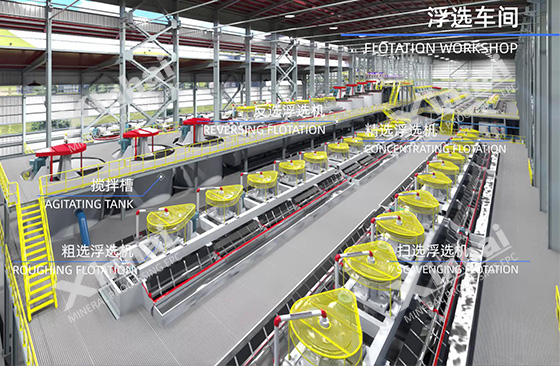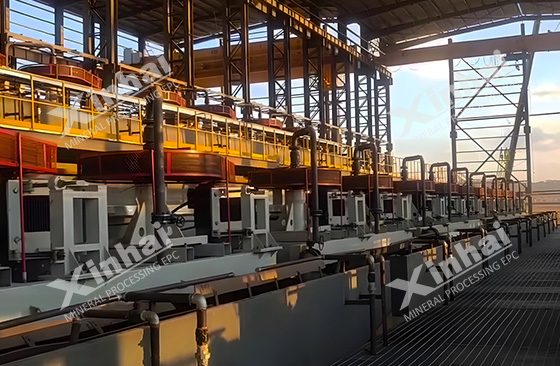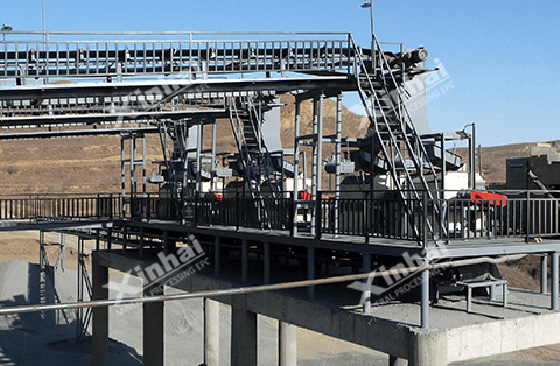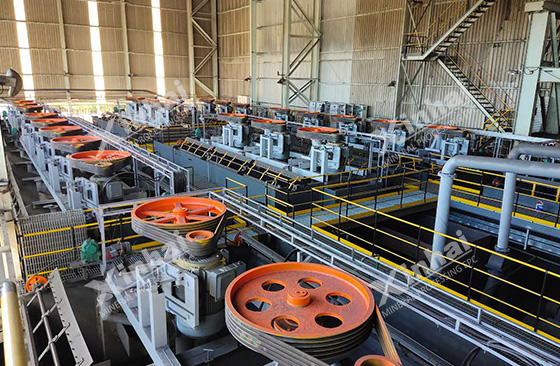
Lithium has been used in many fields, such as metallurgy, aviation, aerospace, etc., especially in the application of lithium batteries and controllable thermonuclear fusion reactors. Therefore, the current global demand for lithium metal is very urgent. Lithium minerals in nature mainly exist in the form of spodumene, lepidolite and lithium feldspar. Spodumene is one of the most widely developed minerals. Since spodumene often coexists with quartz, feldspar, mica and other gangue minerals, it will cause the spodumene mineral to become more muddy, thus affecting the beneficiation effect of spodumene and making it more difficult to be beneficiated.

Flotation method is currently a commonly used method for spodumene beneficiation. Generally, it is necessary to add "three alkali and two soaps" to the slurry to improve the collection ability of the target mineral. The common spodumene flotation processes in mineral processing plants are mainly one roughing, two sweeping, and two fines. The medium ore obtained in the process is returned to the closed-circuit process, and desliming before flotation is very necessary. The return treatment of medium ore will affect the stability of roughing and beneficiation. The specific operability is not strong and the applicability is limited, so the beneficiation index is not very ideal. In order to overcome the problems existing in the existing technology, the following will introduce you to a magnetic flotation combined beneficiation process for spodumene. This process is stable, highly adaptable, and has ideal concentrate quality and recovery rate.
The combined technological process of spodumene magnetic flotation is roughly as follows: raw spodumene ore is crushed and ground, and the grinded pulp is subjected to weak magnetic separation and strong magnetic separation in sequence to obtain weak magnetic concentrate and strong magnetic concentrate. The strong magnetic tailings are concentrated and deslimed and then enter the flotation operation, and the processed lithium concentrate is obtained.

(1) Spodumene grinding-classifying operation: The raw ore enters the crusher for coarse crushing, medium crushing and fine crushing before grinding. The grinding operation often forms a closed loop with theclassifying operation, thereby improving the ore utilization rate.
(2) Spodumene weak magnetic-strong magnetic separation operation: the products after grinding and classification enter the magnetic separator for weak magnetic separation and strong magnetic separation to obtain weak magnetic concentrate and strong magnetic concentrate. For weak magnetic separation, a permanent magnet drum type magnetic separator can be used, and the magnetic field intensity is set at 150~175kA/m. When minerals are subjected to strong magnetic separation, a high gradient magnetic separator is used, and the magnetic field strength is generally 770~950kA/m. Weak magnetic separation concentrate can further recover the iron-containing minerals, and strong magnetic separation concentrate can obtain tantalum, niobium and other elements through gravity separation.
(3) Magnetic concentrate concentration and desliming operation: This process is only carried out for strong magnetic separation tailings. The concentration range of the underflow slurry after concentration and desliming is 32% to 38%.
(4) Spodumene flotation operation: When the concentration of the concentrated and deslimed underflow reaches the required level, it is fed into the flotation operation. The flotation process includes one rough selection, two sweeps, and two selections. After flotation, the lithium concentrate is obtained and the tailings are discharged. The collector used during flotation is a compound collector of fatty acid calcium, hydroxylamine compounds, and oleic acid. The adjusters used during roughing are sodium carbonate, sodium hydroxide, and calcium chloride.

1. The medium ore produced in the flotation process adopted by this process does not need to be returned to roughing. The flotation process is more stable and the mineral processing index is good.
2. Use weak magnetic and strong magnetic separation to further recover valuable elements in minerals, such as recovering iron minerals in weakly magnetic concentrates and recovering tantalum and niobium elements in strong magnetic concentrates.
3. The use of compound collectors can bring into play the synergistic effect between various agents and learn from each other's strengths to offset weaknesses. This composite collector has the advantages of good selectivity and strong collection ability.
4. This process is simple, stable, reliable and highly applicable, and the flotation reagents used are environmentally friendly. In addition, the obtained spodumene concentrate has high grade and recovery rate.

The above is a brief introduction to the process and advantages of a kind of spodumene magnetic flotation combined mineral processing. The optimization of specific process flow and the setting of mineral processing equipment should be determined according to the ore characteristics and production requirements. Xinhai Mining recommends conducting mineral processing test analysis to determine the composition of the ore, and customizing and designing a reasonable spodumene mineral processing process based on the test results to obtain good economic benefits of mineral processing indicators.
To find out more about our products and solutions, please fill out the form below and one of our experts will get back to you shortly.